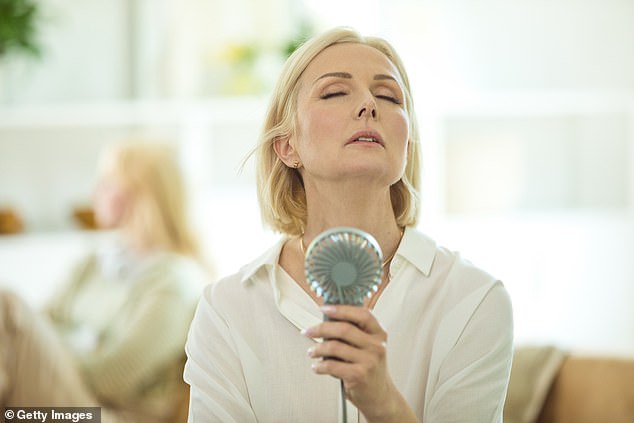I have recently begun having heart palpitations – a fluttering sensation in my chest. It is always a bit frightening. Should I be concerned?
Dr Ellie responds: No matter what age you are, palpitations should always be explored with your GP. There are a huge number of possible causes and, while they may not all be serious, it is important to understand what is going on because treatment may be necessary to control your heart rate or your heart rhythm.
It does feel frightening because our body recognises a racing heart as a sign of fear – it’s our fight-or-flight response.
One of the most common causes of palpitations would be anxiety, as the heart races when we are nervous or frightened. However, a doctor would generally want to explore physical causes before definitively diagnosing that.
An important investigation for someone with palpitations would be an ECG monitor, which you wear for at least 24 hours to see if it records any changes in your heart rate or rhythm when you are feeling a palpitation.
Some people experience these when their heart goes too fast – something we call tachycardia – but this can also occur when the heart rhythm changes. This can happen if you experience extra beats of your heart, ectopics, but also with heart-rhythm conditions such as atrial fibrillation (AF).

One of the most common causes of palpitations is anxiety, explains DR ELLIE CANNON, as the heart races when we are nervous or frightened
It is very important to diagnose causes of palpitations as some, such as AF, can be a risk factor for serious problems, such as heart attack or stroke. Some heart-related causes of palpitations require medication.
Blood tests are usual for palpitations, as other medical problems such as anaemia and thyroid disease can be a cause. Alcohol, caffeine and nicotine can contribute. Ask your doctor if any tablets you take could be a cause.
You often mention hair loss and conditions that trigger it, but don’t mention old age. Is there anything to improve hair loss in women in their 70s and older?
Dr Ellie responds: Hair loss in women may be related to medical conditions such as thyroid disease or a lack of iron, as well as fungal infections of the scalp. But there is also a degree of hair loss that comes with the menopause, due to reduction in the female hormone oestrogen, as well as simply age-related hair loss which affects everybody.
Improving hair loss, even if it is age-related, will also involve ensuring iron stores are high enough, with a good iron-rich diet or supplements as well as ensuring otherwise good nutrition. It is worth making sure hair products are not contributing to hair loss.
The blood test that is worth checking is called ferritin, which measures the body’s iron store. It is often worth trialling an antifungal shampoo or scalp treatment from the pharmacist to see if it improves matters.
Good hair growth is also associated with certain B vitamins, and the supplements you can buy that are focused on hair – including these vitamins and other minerals such as zinc and selenium – may be beneficial. Female-pattern hair loss can also occur with age and usually involves losing hair around the crown and the front, as well as noticing your parting getting wider.
This is more common if you have a family history of female hair loss with age, but can also affect as many as half of women over the age of 70.
It is certainly more common in caucasian women and tends to be worse with stress and smoking, as well as sun exposure. Medical treatment for female-pattern hair loss, called minoxidil, can be bought over the counter from pharmacists.
Every three or four weeks, my sister suffers four days of hell. Her pulse goes up and her mouth gets so dry she struggles to talk. Her doctor has tried many routes, including blood tests, to solve this issue that has been going on for over a year. Do you have any suggestions?
Dr Ellie responds: The obvious question to ask, with something that happens to a woman once every three or four weeks, is whether or not this is a problem related to the menstrual cycle.
While people would classically associate premenstrual syndrome, or PMS, with mood-related symptoms, there can be a whole host of symptoms from premenstrual disorders, some of which can be disabling.
A raised pulse and dry mouth are classic symptoms of anxiety, which is a clear psychological symptom of premenstrual syndrome, and may also be related to physical symptoms such as headaches and reduced brain function.
Another reason that somebody could have symptoms very regularly in episodes could be an allergy or intolerance. For example, something that they eat regularly that causes this reaction, or even a response to certain types of alcohol.
It could even be something as random as an allergen in the home or work environment, such as chemicals or cleaning products, or perhaps medication that is taken only sporadically.
The only way to ascertain this would be to keep a symptom diary, alongside documenting what was happening each day and in days prior to episodes.
These may be psychological – the symptoms are physical but they may come from a mental health or emotional cause.
As a GP, I would explore whether these episodes are related to stress or burnout from work, as the symptoms are very similar to anxiety and exhaustion. It could also be possible that they come from a trauma response, and that something is happening each time to trigger this reaction.

Hot flushes are one of the most common symptoms of the menopause
Talk to GPs about the menopause
I am delighted that menopause questions will now be included in the NHS Health Check for the over-40s.
We’ve talked a lot about menopause in recent years, but still not enough about women and heart disease. After menopause, women become more vulnerable to heart attack and stroke as their falling oestrogen levels remove the natural protection it provides.
So this update is particularly relevant to the Health Check, which is an initiative designed to prevent cardiovascular disease. It’s especially relevant to women who have gone through the menopause before the age of 45, for any reason.
A very positive step for women’s health and the NHS.
Have you beaten high blood pressure without pills? Tell me how
Of all the long-term health conditions I see, high blood pressure is the one where patients can make the biggest difference without medication.
NHS guidelines list lifestyle changes as the first line of treatment – and I’ve seen them work time and time again.
Reducing stress, cutting salt, losing weight and exercising regularly can all make a real impact. But we all know that lifestyle changes are not easy.
Please use the email address below to let me know if you’ve managed to lower your blood pressure by yourself.
